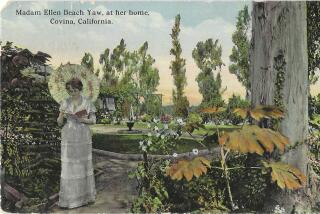Dutch Soprano Shows She’s Not the Retiring Type
- Share via
To cap a career that lasted more than four decades, beloved Dutch soprano Elly Ameling gave a series of farewell recitals last year and then retired. Or so she thought.
“I thought, after singing for 40 years, I would be reading the books I have at home [in Holland] and tending my roses,” Ameling said by phone from San Diego recently. “But I’m as busy as ever. And I feel it’s my duty to pass on what I know.”
Now she’s on tour doing just that, teaching young singers in a three-week series of classes that starts tonight at Cal State Long Beach and ends in New York.
She has a lot to pass on. After making her debut in 1953, Ameling was regularly praised for her splendid technique, great personal warmth and unaffected presence and delivery.
She worked with conductors such as Ernst Ansermet, Carlo Maria Giulini, Wolfgang Sawallisch, Edo de Waart, Raymond Leppard, Andre Previn and Seiji Ozawa, among others. She leaves a recorded legacy of some 150 albums that cover a wide-ranging repertory.
Her voice, even over the phone, even at 63, remains rich and vibrant. She speaks impeccable English and sounds happy and energetic as she anticipates this new series of classes.
“I will be emphasizing interpretation, not technique,” she said. “The singers are studying technique with their teachers, and what would happen if comes this lady from Holland and says something that upsets their whole system?”
Besides, “American singers have good and very complete technique. Their mastery of languages is not so good.”
The real problem for today’s singers comes in understanding the context of the songs.
Singing German romantic lieder, for instance, “would be hard if the singers had no inkling of what people felt like then and how they expressed those feelings then--what a boy said to a girl, how people approached each other then,” Ameling said. “Lovers are so different now.”
French culture was “totally different” from German. “You have to explain all these different, surrounding circumstances. The French melodie presents emotions in a more distant way, generally speaking. The speaker holds up a frame and says, ‘This is the picture of . . . ‘
“The German is more direct: ‘Gretchen utters this from her own heart.’ Of course, this is generally speaking.”
Art-song singers typically sing a recital consisting of 70% German lieder, 30% French melodie “even in France itself. I don’t know why. There is a wealth of melody in the earlier Romantics--Brahms and Schubert.”
She can accomplish only so much in a three-hour session. A better method, she feels, “would be to spend more time with the students over a longer period, say 10 evenings, so I could really lay out the carpet of a past culture.”
Ameling enjoys teaching, but discovered she had to go through her own learning process. “I’d get so involved, I’d be exhausted. I’m improving. The trick is to see what the student needs and how much criticism the person can stand. There’s a psychology to it.”
And there’s the matter of the public audience that is allowed to audit her classes.
“They want a good laugh,” she said. “There is a lot to laugh about, and it helps to get a little laugh by telling a story, especially if [a particular student] is nervous.”
She prefers not to instruct by example because she’s found that students “tend to imitate their voice teachers.”
“In Holland, where I teach a little, I hear students and I can tell, this is a student of Mr. A and this is a student of Mrs. B. So what really helps is to give many examples. I will play several recordings of a particular song by various artists so they can hear and compare the differences.
“But students are impatient. They want to start singing right away.”
* Elly Ameling will conduct master classes tonight and Tuesday at 7:30 p.m. at Cal State Long Beach, 1250 Bellflower Blvd. Tonight’s class will be held in the Daniel Recital Hall; Tuesday’s will be in Room MUA-310. $10 per class. (562) 985-5112.
More to Read
The biggest entertainment stories
Get our big stories about Hollywood, film, television, music, arts, culture and more right in your inbox as soon as they publish.
You may occasionally receive promotional content from the Los Angeles Times.








